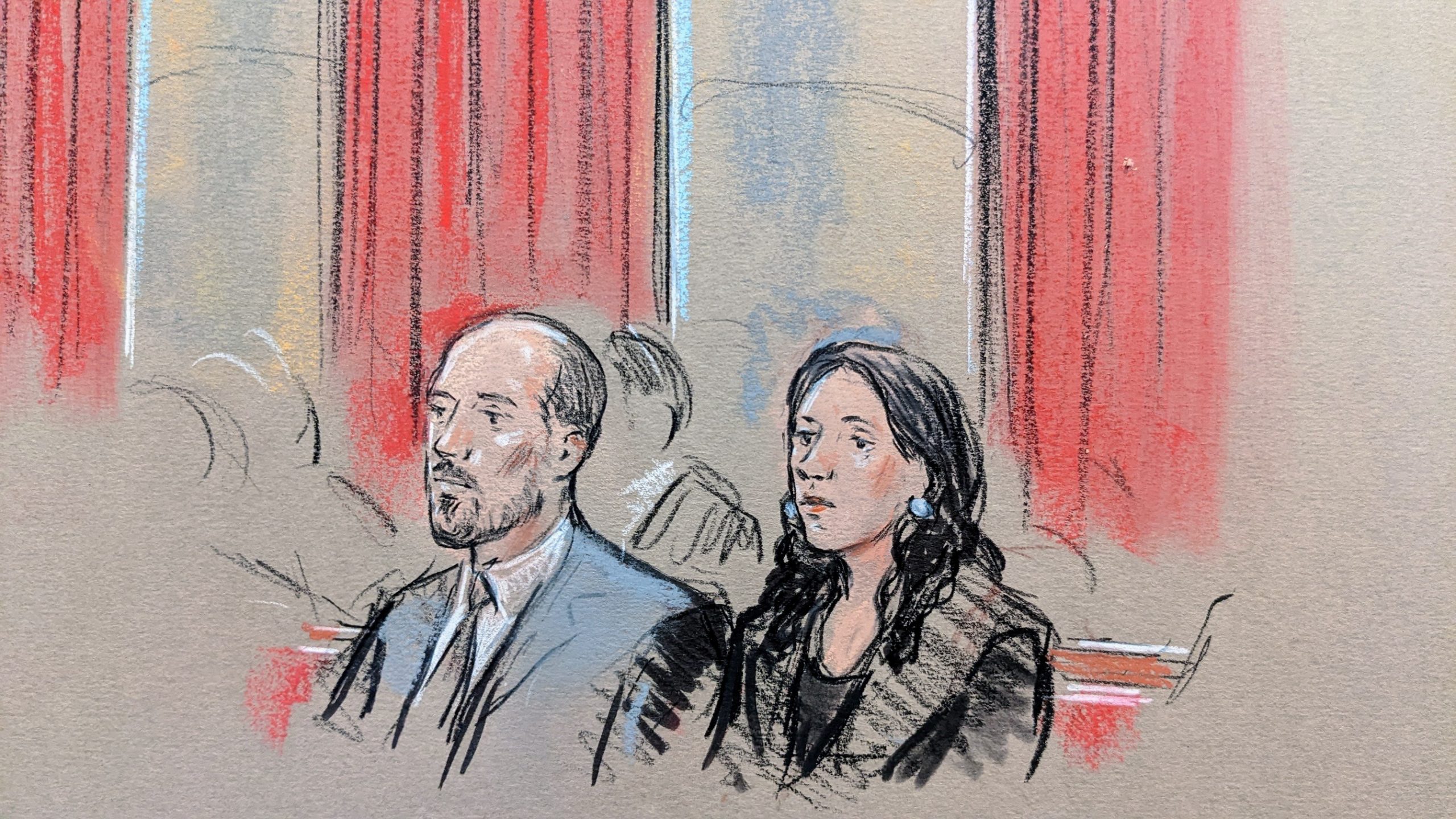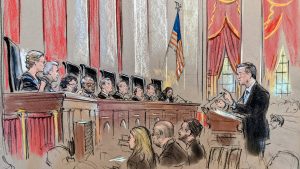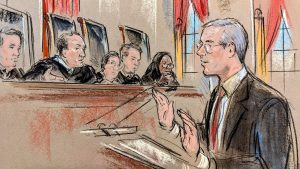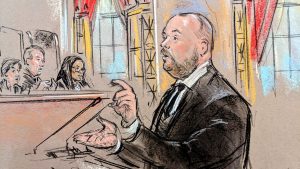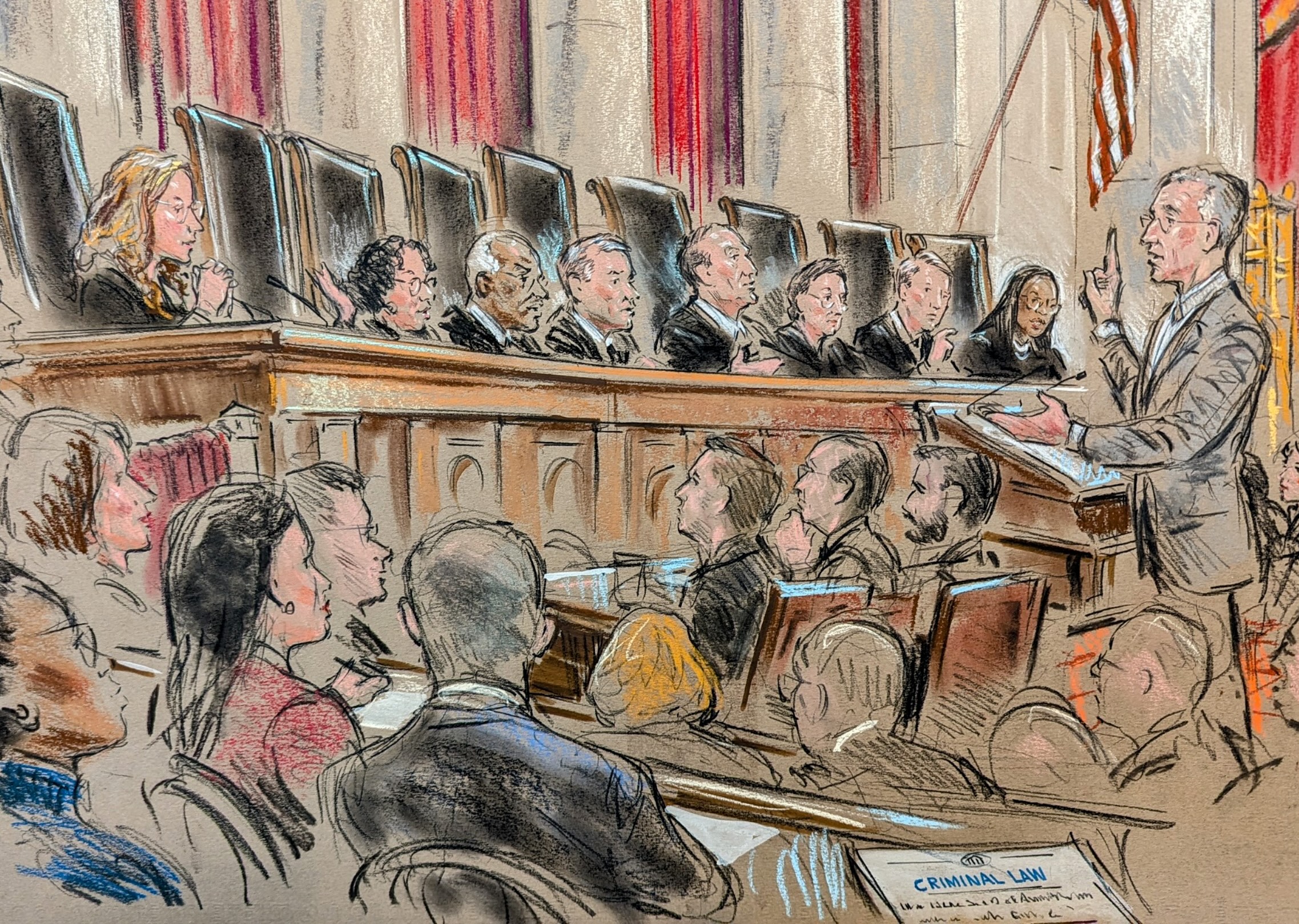Closely divided court scrutinizes various provisions of Indian Child Welfare Act
ARGUMENT ANALYSIS
on Nov 9, 2022
at 6:02 pm
Chad and Jennifer Brackeen listen to oral argument in Haaland v. Brackeen. Their efforts to adopt a child whose birth mother is Navajo led to a constitutional challenge to the Indian Child Welfare Act. (William Hennessy)
The Supreme Court appeared divided on Wednesday over the constitutionality of a 1978 law that regulates the adoption of Native American children. After more than three hours of oral argument, several justices expressed doubt about specific provisions of the wide-ranging law, even if they did not appear inclined to strike down the law in its entirety.
Congress enacted the Indian Child Welfare Act as a response to a long and tragic history of separating Native American children from their families. The law establishes minimum standards for the removal of Native American children from their families and establishes a preference that when Native American children are taken from their homes, they be placed with extended family members or with other Native families, even if the families are not relatives. Opponents of the law say it exceeds Congress’ power, violates states’ rights, and imposes unconstitutional race-based classifications.
Representing the seven individual plaintiffs who are challenging ICWA, including three non-Native couples who tried to foster or adopt children with Native American ancestry, lawyer Matthew McGill told the justices that ICWA “flouts the promise of equal justice under the law” by treating Native American children differently. And McGill insisted that ICWA falls outside Congress’ power to regulate Native American affairs, arguing that Congress does not have the “power to regulate Indians everywhere, wherever they might be in the jurisdiction of the United States.”
Matthew McGill argues for the individual plaintiffs. (William Hennessy)
Justice Amy Coney Barrett countered that the Supreme Court has described Congress’ power to regulate Indian affairs as “plenary” – that is, absolute. “Are you asking us,” she queried, “to overrule all of those precedents?”
Justice Neil Gorsuch, arguably the court’s strongest champion of Native American sovereignty, observed that the Supreme Court has never struck down laws based on the exercise of Congress’ plenary power to regulate Indian affairs. Gorsuch also pushed back against McGill’s suggestion that family law is a state, rather than federal, matter. The federal government has long been involved in family law for Native Americans, he noted. Indeed, Gorsuch posited, it might be “a little anachronistic” to contend that states have a special interest in applying their family laws to Native Americans when, for many decades, “they didn’t do anything at all.”
Justice Elena Kagan also viewed Congress’ power over Native American affairs as very broad. “Plenary,” she told Texas Solicitor General Judd Stone, means “unqualified.”
Justice Samuel Alito worried aloud that Congress’ plenary power could be unlimited under the interpretation advanced by the federal government and a group of Native Americans tribes that are defending the law.
Edwin Kneedler, the deputy solicitor general who argued on behalf of the federal government, reassured Alito that Congress does not have unlimited power to regulate Native American affairs. Instead, he stressed, Congress’ exercise of its power must be rationally related to Congress’ unique obligations to Native Americans.
Deputy Solicitor General Edwin Kneedler argues for the federal government. (William Hennessy)
Gorsuch also expressed concern that, if the Supreme Court were to strike down ICWA on the ground that it exceeded Congress’ power, other laws intended to benefit Native Americans – on topics ranging from health care and the environment to religious liberties – would also be in jeopardy.
Several justices raised the question whether ICWA violates the Constitution’s guarantee of equal protection, which generally prohibits the government from discriminating based on race, gender, or ethnicity.
Gorsuch did not see a constitutional problem. The Constitution, he emphasized, describes the tribes as separate sovereigns, so that the distinctions that ICWA draws are political, rather than racial. And the Supreme Court’s 1974 decision in Morton v. Mancari, he continued, made clear that this is a political classification.
Kagan agreed. She told McGill that the Supreme Court has “a long history of cases where we’ve understood legislation relating to the tribes as political.” By contrast, she continued, “you have one case,” involving “a very different situation” in which the “classification did not relate to a tribe.”
For Justice Brett Kavanaugh, however, it was a harder question. He described ICWA as “difficult” because the court has to find the “fine line” between two competing principles: respect for tribal self-government, recognizing the long history of oppression of Native Americans; and, on the other hand, the general principle that people should not be treated differently based on their race or ancestry. Where, Kavanaugh asked Stone, do we draw the line?
Some justices focused specifically on McGill’s contention that ICWA displaces the “best interests of the child” standard that state family courts would normally apply. Sotomayor noted that the federal government has superseded state family law in other arenas – for example, with the Hague Convention on the Civil Aspects of International Child Abduction, which applies to cases brought in U.S. court seeking the return of a child who was abducted to the United States. The Hague Convention, Sotomayor observed, doesn’t apply the “best interests of the child” standard, instead requiring courts to return children to their home country so that courts there can resolve any custody disputes.
Other justices were troubled by what they referred to as ICWA’s “third preference” – the preference that if a Native American child cannot be placed with either members of her extended family (the first preference) or members of the same tribe (the second preference), she be placed with members of another tribe.
Chief Justice John Roberts offered a hypothetical involving a Native American baby without any extended family members available to take care of her, and a non-Native couple willing to adopt her. Does the priority of having Native American adoptive parents, Roberts asked, trump the best interests of the child?
Kneedler emphasized that Congress enacted ICWA precisely because of the long history of separating Native American children from their families. Congress was “concerned about the free-floating application of the ‘best interests of the child’ standard,” Kneedler said, and determined that it was in the best interests of Native American children to remain, when possible, with non-family members who are Native American rather than go to non-Native families.
But Kavanaugh and Barrett appeared unconvinced. Kavanaugh suggested that the “third preference” was not based on a political classification precisely because a Native American child could be placed with a family from a different tribe.
Barrett echoed this idea. This “third preference,” she suggested, treats the different Native American tribes as fungible.
Both Kneedler and Ian Gershengorn, who represented the tribes, assured the justices that the third preference rarely comes into play. And in any event, they said, tribes have common interests – including a political relationship with the federal government – and common spiritual practices.
Gershengorn also suggested that the justices’ concerns about the third preference were unfounded. Although the justices may have been worrying about a scenario in which a child from a tribe in one part of the country, such as Maine, is sent to live with a family belonging to a tribe in a completely different part of the country, such as Oklahoma, Gershengorn explained, “that case has never happened that we have been able to find.” Indeed, he added, it is common for members of one tribe to live on another tribe’s land.
Ian Gershengorn argues for the Native American tribes. (William Hennessy)
Barrett also raised questions about whether some provisions of ICWA violate the 10th Amendment’s “anticommandeering doctrine,” which prohibits the federal government from requiring states and state officials to adopt or enforce federal law. Barrett was skeptical that an ICWA provision requiring states to maintain records regarding the placement of Native American children “commandeers” the states, but she was more concerned about ICWA’s requirement that states make “active efforts” to avoid break-up of the Native American family.
But Gorsuch downplayed the “active efforts” provision, noting that it applies both to the states and to private placements of children – and is therefore not an effort to coopt state machinery.
Justice Ketanji Brown Jackson also did not view ICWA as creating any anticommandeering problems. If Congress believes that legislation like ICWA is necessary “to avoid the extinction of tribes,” she observed, it would be odd to say that ICWA is invalid because of the “relatively new” anticommandeering doctrine – which has not previously been applied to Native American affairs.
Two justices raised questions about standing – the legal right to bring the lawsuit in the first place. Gorsuch was doubtful that the individual plaintiffs had a right to challenge ICWA’s provisions as an equal protection violation. The individual plaintiffs, he noted, have sued federal officials, but they can’t tell state family-court judges what to do – and therefore the lawsuit cannot provide any relief for them. “I would think that might be the end of it,” he told McGill.
And Justice Clarence Thomas asked Stone how the state had a right to sue. You are representing parents and potential parents, Thomas said, who can represent themselves.
Texas Solicitor General Judd Stone argues for Texas. (William Hennessy)
Stone countered that ICWA does regulate Texas directly. If it doesn’t comply with ICWA, he told the justices, Texas could lose millions of dollars in federal funding for Social Security. Texas is also harmed by the equal protection violation that ICWA creates, Stone continued, because it costs the state money to determine whether a child is a Native American and therefore covered by ICWA.
With relatively little interest in the standing question, it seemed likely that the justices will consider the merits of the claims at the heart of the case. How they will rule on those claims remains to be seen, but Wednesday’s argument suggested a result that, although not what the federal government and the tribes might want, also might not be the catastrophic result that they have feared.
This article was originally published at Howe on the Court.

